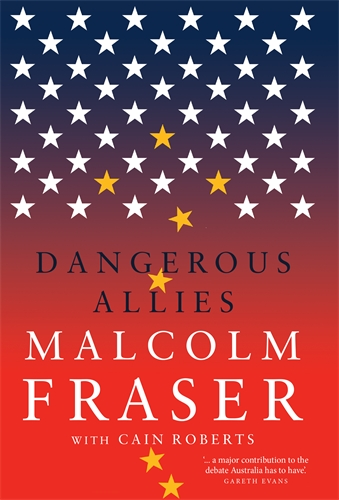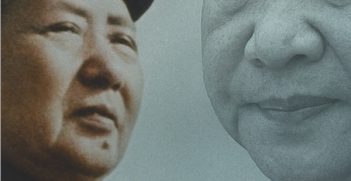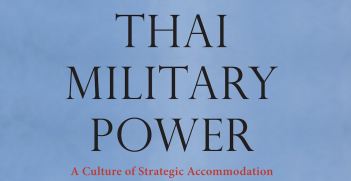Dangerous Allies

Malcolm Fraser’s book Dangerous Allies is the latest round in a debate that can be traced back at least as far as the Crimean War in the 1850s. Should Australia, a small population occupying a large area in a volatile part of the world, ensure that it maintains strong alliances with a great power that largely shares our interests, values and even identity; or does that attitude lead us into subservience to distant and unreliable powers, dragging us into ‘other people’s wars’?
As a Liberal Minister for the Army and Minister for Defence during the Vietnam War and as Prime Minister from 1975 to 1983, Malcolm Fraser was a leading spokesman for the Australian-American alliance. Few then would have expected him to denounce Britain and the United States as ‘dangerous allies’ and advocate renouncing Australia’s tradition of ‘strategic dependence’ and establishing ‘a truly independent Australia’. The transition has been taking place over many years. When charged with having moved to the left, Fraser has responded that his former party has moved to the right. The book establishes that both statements are true. Fraser is now well to the left (on asylum-seeker policy as well as national security) not only of the conservative coalition but also of the modern day Labor Party. The only current politician who is quoted with commendation in the book is Greens Senator Scott Ludlum.
Dangerous Allies, co-authored with Melbourne academic Cain Roberts, uses both historical argument and personal recollection to support Fraser’s case for a renunciation of the Australian-American alliance. All history is selective but the historical chapters of Dangerous Allies are distinctly uneven and rely on dated historiography. The chapter praising Dr Evatt as a pioneer of an independent Australian foreign policy, for example, reads as if it were written in the late 1960s or early 1970s. Since the 1970s a number of historians have argued that the Australian style in foreign policy, since the late nineteenth century, has been to pursue national interests within the alliance framework. The book reflects an inadequate understanding of much that has been published in the last twenty or thirty years.
This historical weakness carries into the chapters on contemporary affairs. Fraser is able to point to many examples, from Gallipoli to Iraq, of the danger of putting too much faith in the strategic competence of our traditional allies. But his argument that we should renounce the American alliance and become truly independent does not really come to grips with the counter-arguments. What would a truly independent and self-reliant policy cost? Would the electorate wear that cost? Would our position in the world be weaker or stronger if we forsook not only the security guarantee implied by the ANZUS Treaty but also our privileged access to American intelligence, diplomatic resources and defence science and technology?
Moreover, most Australian governments since Alfred Deakin have claimed that there is no need to choose between our alliances and our regional relationships. Our alliances, they say, strengthen us in the region while our regional relationships give us credibility in our alliances. John Howard said we did not need to choose between our history and our geography; Kevin Rudd said we could walk and chew gum at the same time. The real challenge for Australian prime ministers and foreign ministers is to maximise the benefits of the alliance while minimising the costs and the exposure to risk. This is an exercise that requires constant effort and discipline on the part of ministers and their advisers, in Australia, in Washington and around the globe. Some Australian governments have been more successful than others in that exercise. A more comprehensive and nuanced record of our strategic history would point to the successes as well as the failures and seek to draw lessons from them.
Fraser is right to point out that the current state of the world creates real challenges in managing the American alliance. Current policy-makers would do well to heed his warnings about the behaviour of great powers, not least those countries that Robert Menzies famously called our ‘great and powerful friends’. But these warnings need to be balanced against a hard-headed assessment of the benefits that Australia gains from the American alliance as well as the simple fact that the Australian electorate would not take kindly to a government that bluntly renounced it. It is unlikely that any Australian government in the foreseeable future will respond to his call to renounce the alliance and adopt a totally ‘independent’ foreign policy; but all governments should learn from his experience and ensure that Australia’s national interests are not unduly subordinated to the demands of alliance maintenance.
Malcolm Fraser with Cain Roberts, Dangerous Allies, Melbourne University Press, Melbourne, 2014
Reviewed by Professor Peter Edwards AM DPhil FAIIA, Alfred Deakin Research Institute, Deakin University





